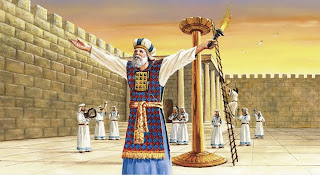In this three part post we will explore Exodus, Leviticus, the Gospel of John, Matthew 24 and the book of Revelation to answer these questions- what is the Feast of Tabernacles? What is its meaning? Is it possible this feast has already been spiritually fulfilled? If so how and when?
Some of you may never have heard of the Feast of Tabernacles. Some of you may celebrate it every year.
Most in Christendom believe in its future fulfilment, however could a close examination of Christ’s words in light of Jewish history, their Calendar, customs and agricultural practices prove otherwise?
SEVEN FEASTS
In Leviticus 23 God instituted seven feasts.
Leviticus 23
4 These are the feasts of the LORD, even holy convocations, which ye shall proclaim -- in their seasons.
These seven feasts revolved around the Jew’s agricultural lifestyle and were celebrated at specific times as per their Calendar.
The Jewish Calendar is different to the Gregorian Calendar we use today. The Gregorian Calendar is solar, whilst the Jewish Calendar is both lunar and solar, with each month beginning at the new moon.
The first three feasts - Passover (Pesach), feast of unleavened bread and feast of first fruits- were celebrated in the first month, Nisan (March/April) and coincided with the Spring harvest of Barley and Flax.
The fourth feast called the feast of weeks or Shavuot, happened in the third month, Sivan (May/June) and coincided with the wheat harvest.
The wheat harvest was right at the end of Spring and marked the end of the grain season.
Not until the seventh month, Tishrei (Sept/Oct), did the final three feasts occur- the feast of trumpets (Yom Teruah), feast of atonement (Yom Kippur) and feast of tabernacles (Sukkot).
These high holy days coincided with the Fall/Autumn harvest of fruits such as olives, grapes, figs and dates.
The feast of tabernacles was the seventh feast, celebrated in the seventh month for seven days and marked the end of the agricultural year, thus it was sometimes called the “feast of ingathering” (Ex. 23:16, 34:22).
PILGRIMAGE FEASTS
Pesach, Shavuot and Sukkot were “pilgrimage feasts”, meaning every able bodied Jewish man had to visit the temple in Jerusalem to offer the first fruits of his harvest to the priest.
The purpose of Pesach, was to remember how God spared the first-born of Israel when they applied the blood of a lamb to the doorposts and lintels of their houses. It was also to remember their deliverance from bondage in Egypt.
In Nisan of around 33AD Jesus was crucified outside the city walls just as the Passover lamb was being killed inside the temple. Thus his crucifixion fulfilled the first pilgrimage feast. He was the Passover lamb.
The purpose of Shavuot was to remember how, 50 days after Israel’s deliverance from Egypt, they arrived at Mnt Sinai where Moses presented them with the 10 commandments. The 10 commandment were like a Ketubah, or Jewish marriage contract. Israel said “we will do” to the Ketubah (Ex. 19:8).
In Sivan of around 33AD (50 days after Christ’s crucifixion), as Jewish men gathered in Jerusalem to celebrate Shavuot, the holy Spirit was poured out and the law was written, not on tablets of stone but upon the hearts and minds of those waiting in the upper room (Jer. 31:33, Heb. 10:16). Thus the second pilgrimage feast was spiritually fulfilled.
SUKKOT
The Hebrew word Sukkot means booths or tents.
According to Leviticus 23, the purpose of Sukkot, was to remember how Israel dwelt in tents while wandering in the wilderness.
Leviticus 23
34 Speak unto the children of Israel, saying, The fifteenth day of this seventh month shall be the feast of tabernacles for seven days unto the LORD.
39 Also in the fifteenth day of the seventh month, when ye have gathered in -- the fruit of the land, ye shall keep -- a feast unto the LORD seven days…
42 Ye shall dwell in booths seven days; all that are Israelites born shall dwell in booths:
43 That your generations may know that I made -- the children of Israel to dwell in booths, when I brought them out of the land of Egypt: I am the LORD your God.
A tent is a temporary dwelling place. Israel dwelt in tents because they were on their way to the “promised land”.
From Acts 2 on, God dwelt in his people by way of his Spirit “ye in me and I in you” (Jn. 14:20).
However our bodies, like tents, are temporal. God wants to tabernacle with us in a permanent sense, for eternity in heaven.
Just as Israel wandered in the wilderness for 40 years before accessing the “promised land”, first century saints were tested and tried in a spiritual wilderness for 40 years (one biblical generation) before accessing their promised land, the city “not made with hands” that Abraham, Peter and Paul groaned for (Hebrews 11:10, 2 Cor. 5:1, 2 Peter 3:13)
Ultimately, this is what the final feast points to.
Let us each work out our own salvation with fear and trembling. God bless.










No comments:
Post a Comment